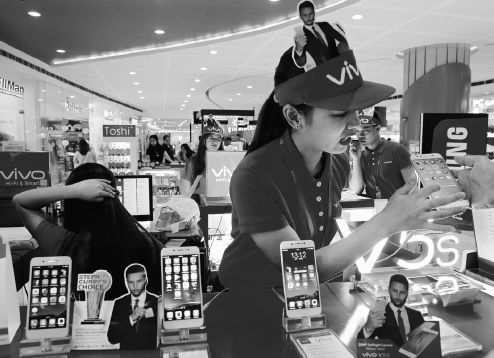A unique subway station in Gurgaon, a city about 30 kilometers southwest of India's capital New Delhi, is named after Chinese tech major Vivo. Its walls are painted with a giant advertisement of the smartphone vendor. The Vivo logo on the subway station, it appears, is bigger than the one on the Chinese company's office building across the street in northern India.
To reduce operating costs, Indian metro operators in various cities outsource the maintenance and daily management of subway stations to the private sector. Vivo has signed contracts to maintain two subway stations in India. The other one is in Mumbai, India's financial and commercial capital located in the western region.
As a result, Vivo became the only smartphone vendor in India that has a subway station named after it.
The move is designed to establish closer bonds with local consumers and to boost its brand image in the world's second-largest smartphone market.
Currently, Vivo's products and services are available in more than 30 countries and regions, with India being one of its key stops in the go-global journey. Vivo started exploring the opportunities in India in 2014, after gaining wide popularity on its home turf with strong offline retail channels and cutting-edge smartphones.
Five years on, the company, based in Dongguan, Guangdong province, is the No 3 smartphone vendor in the South Asian country. It has a better understanding of its own go-global strategy, which is summarized as "more local, more global".
"'Go-global' is not about how many countries a company operates in. It is about how we have tried our best to use a local mindset and integrate with local culture and local management styles to serve local consumers," said Chen Zhiyong, CEO of Vivo India. "That is what Vivo founder Shen Wei has summarized as 'more local, more global'."
Currently, the company accounts for 15. 2 percent of the Indian smartphone market, according to the latest data from the market research company International Data Corp. From July to September 2019, Vivo registered strong year-on-year growth of 58.7 percent.
When it comes to offline retail, Vivo has climbed to the second spot in October, grabbing 23 percent share, data from another market research company Gfk showed.
None of these milestones was reached easily. For instance, every company is looking for ways to get associated with Bollywood and cricket, two critical factors in India, to boost their brand awareness.
Since it is said opportunities beckon only those who are prepared, Vivo has established links with local cricket associations as soon as it entered India. It was among the first to know that there was a chance to sponsor the Indian Premier League, the most popular franchise-based cricket tournament in the game's shortest format.
Finally, in 2015, Vivo spent about 2.2 billion yuan ($320 million) to be the title sponsor of IPL for five years. At the signing ceremony, something interesting happened. Vivo India's CFO paid the first instalment of the sponsorship money immediately. The prompt, upfront payment came as a complete and pleasant surprise to the IPL Governing Council as Vivo still had 48 hours to the deadline.
"It was a big amount of money which, if put in the bank for 48 hours, can generate handsome interest. But since we had already inked the deal, we wanted to show our sincerity. It's part of our Vivo culture that we never make small gains at other people's expense,"Chen said.
Vivo is influencing not only its partners but also its employees with its unique culture. An Indian worker at Vivo's plant in the Greater Noida area of Uttar Pradesh state, said he used to work for South Korean company Samsung's local factory earlier.
"Operations in Samsung are more system-based, but Vivo is more culture-driven," he said. The elevators of Vivo's plant are decorated with posters that explain the company's Benfen culture, which has a profound meaning ("do the right thing, no matter what", and "never try to benefit at the expense of others").
The Vivo plant employs more than 9,900 workers, and runs at full annual production capacity of 25 million units. Vivo is investing 4 billion yuan to set up a second manufacturing plant in India, to better meet local consumers' growing demand.
Xiang Ligang, CEO of telecom industry website Cctime, said:"Amid fierce competition in India, Vivo has infused the market with its own characteristics. For instance, it is the first and only smartphone vendor that runs all of its after-sales service centers, to ensure quality."
In its latest Indian advertisement featuring actor Aamir Khan, who is also well known in China thanks to his smash hits such as Dangal and Secret Superstar, Vivo made a bold move by telling users to take a break from their phones, a message that some commentators interpreted as potentially suicidal for a smartphone company to spread.
But the message triggered positive responses online. The target audience of consumers took it as "Your loved ones wish for your time. Vivo encourages you to choose your switch-off time".
"We have more than 55 million consumers in India. I feel the onus is on us to spread the right message about the responsible usage of smartphones," said Nipun Marya, director of brand strategy, Vivo India.
Indians now account for 95 percent of Vivo India's employees, with factory workers, salespersons and people in its local headquarters all recruited locally.
"We can now say we have survived in India. We will use what we have learned here as the first signs of dawn to light up our long way to going global," Chen said.

